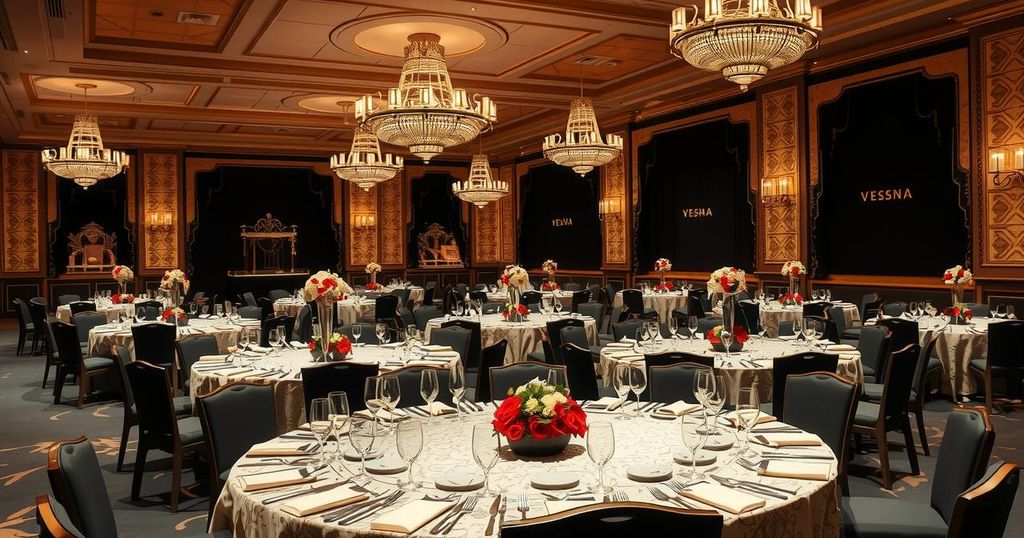Dinner with Trump Costs an Astonishing $1 Million per Seat on Average
Over 200 wealthy crypto enthusiasts will dine with Donald Trump, having spent an astounding $394 million on his cryptocurrency token, $TRUMP. This dinner, set at Trump National Golf Club, has sparked scrutiny due to legal questions surrounding foreign nationals attending and the connection between Trump’s business interests and political fundraising. The average winner spent nearly $1.8 million to secure a seat at this black-tie event.
In a jaw-dropping spectacle, more than 200 affluent crypto enthusiasts will dine with former President Donald Trump in Washington on Thursday. The entry fee? Well, it ranges from a staggering $55,000 to a staggering $37.7 million, depending on how much these dinner-goers invested in Trump’s cryptocurrency token, $TRUMP.
The blockchain analytics firm Nansen delves into this curious event, revealing that attendees, numbering around 220, spent a collective $394 million on the $TRUMP coin, a currency that, like many in the crypto world, suffers from wild value swings. This sum has raised eyebrows, considering the dinner ticket essentially comes with the purchase of a meme coin.
In a quirky twist, Nansen contextualizes the absurdity – the average winner forked out a whopping $1,788,994.42. 67 of these winners dropped over a million bucks apiece, while some – the bottom 24, for instance – merely spent under $100,000. The top seven, however, didn’t hold back, each investing over $10 million to secure a spot at the black-tie optional dinner.
Set at Trump National Golf Club in Washington, D.C., the dinner aims to be a high-profile event but has some complex affiliations. The contest website suggests that Trump is merely a guest, not embroiled in solicitation. However, it’s worth noting that approximately 80% of the $TRUMP token is owned by two companies, both aligned with Trump himself – CIC Digital and Fight Fight Fight LLC.
Critics have swiftly pointed out the blurred line between personal profit and public service, as Trump’s business interests are nestled in a trust run by his son. And sure, hosting events like this fancy dinner at his own clubs raises eyebrows. Naturally, the crypto associated with this initiative derives profits for Trump-tied groups through trading fees, reportedly netting around $900,000 in just the first two days following the contest announcement.
Legal loopholes are at play too. Dan Weiner, a director at the Brennan Center for Justice, notes, “The president is not subject to the broad prohibition on conflicts of interest that affects almost everyone else who works for the federal government.” You have to wonder: could it be more wild? This level of business intertwined with political fundraising takes the cake.
A spokesperson for the White House, Anna Kelly, assured the public: “The President is working to secure GOOD deals for the American people, not for himself.” But while the dinner pricks the interest of American citizens, many of the big-ticket winners aren’t even U.S. residents.
The hint of foreign nationals purchasing in droves becomes evident as crypto researcher Molly White reveals that among the 220 wallet addresses winning the contest, around 72% seem to point back to foreign entities. Some, for instance, hail from places like Singapore and Australia. This raises critical questions about the legality of political donations from non-citizens in the U.S., a significant irony highlighted by Weiner.
In reality, many individuals funding this currency are not legally allowed to donate directly to Trump’s campaign — indeed, the donation limit stands at $3,500 per person. So the following thought lingers: How are these transactions perceived in the realm of political financing? The implications linger ominously as they contradict existing laws designed to deter foreign influence in American politics.
In summary, the upcoming dinner with Donald Trump showcases a curious blend of luxury and cryptocurrency, with participants reportedly spending hundreds of millions just to attend. Rife with contradictions, the event raises significant questions about legal boundaries in political financing, especially given that many attendees are likely foreign nationals who cannot legally donate to U.S. political campaigns. Ultimately, the intersection of Trump’s business pursuits and political engagements continues to echo the complex dynamics of his presidency.
Original Source: www.nbcnews.com




Post Comment